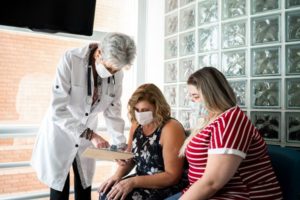8 Questions to Ask Before Hospital Discharge
 The American Academy of Family Physicians recently reported that during the past two years, many patients have put off their medical care—a “side effect of the pandemic,” they call this delay. Hospitals were often overwhelmed, as well, creating another reason some care was postponed. But now, patients are once again urged to schedule elective surgeries, such as hip replacement or cataract surgery—and of course, to promptly seek emergency hospital treatment.
The American Academy of Family Physicians recently reported that during the past two years, many patients have put off their medical care—a “side effect of the pandemic,” they call this delay. Hospitals were often overwhelmed, as well, creating another reason some care was postponed. But now, patients are once again urged to schedule elective surgeries, such as hip replacement or cataract surgery—and of course, to promptly seek emergency hospital treatment.
After their hospital stay, some patients will be discharged to a skilled nursing facility. Others may go directly home. Either way, with hospitals much busier these days, more responsibility is falling on patients and family caregivers to know what to do after discharge. Patients can be groggy and overwhelmed, unable to process or remember a lot of information, so the support of an accompanying family member or friend can be very important. However, these days there still may be restrictions on whether support persons can be in the prep and recovery areas.
You will likely meet with a discharge planner receive printed materials or a link to information online. But there’s a lot to know and staff may be busier than usual. Before you are discharged, be sure you know the answer to these questions:
- “What is my diagnosis/prognosis?” If you were hospitalized because of an illness, make sure you understand what your diagnosis is before leaving the hospital. Has the treatment cured it? What steps do you need to take to ensure it doesn’t recur? If you were in for surgery, did everything go according to plan?
- “What should I expect regarding recovery?” How long will your recovery take? Make sure you understand what specific things may happen—might you be nauseated, dizzy, or in pain? Which symptoms are normal and to be expected? Which signs mean you should contact the doctor immediately?
- “What medications do I need to take and what are their side effects?” If you have prescriptions for medications, make sure you know what they’re for, how they should be taken (for example, with food or before bedtime), side effects to be aware of, any foods that need to be avoided, and if these drugs are safe to take with your other prescription and over-the-counter medications.
- “When I can return to normal activities?” If you are discharged to a skilled nursing facility, when might you be able to go home? How soon will you be able to return to work or your volunteer activities? When can you walk the dog, vacuum, walk up stairs or exercise? Make sure you understand what your new reality will mean in terms of daily living. If you’re going home, do you need to plan for single-story living for a while? Are limitations on your activities temporary, or will you have to make some long-term changes?
- “Will I need personal assistance during my recovery?” Will you need transportation home? Assistance with medication management, wound care and other care tasks? Will you need help with hygiene tasks and meal preparation? If you are discharged home and can’t arrange for family and friends to provide this help, can hospital social workers, discharge planners or case managers help connect you with resources in your community, such as senior support services or professional in-home care?
- “Will I need any medical equipment?” Do you need to arrange in advance for special equipment, such as oxygen, a hospital bed, a commode, a shower chair, or assistive devices such as a wheelchair, walker or crutches? Should you have a supply of other medical supplies, such as bandages?
- “When should I return for follow-up?” You’ll most likely need one or more doctor visits to ensure you’re recuperating properly. Physical therapy and other medical tests might be advised. Make sure you have the information written down, or confirm that you’ll be called or emailed with the information and a reminder.
- “If something goes wrong, who do I call?” Make sure you have a phone number, an email address or web portal to use in case of an emergency. If your doctor works with other physicians and isn’t always on call, get the names of the other physicians in the practice.
You may have other questions unique to your situation. Don’t hesitate to ask. If you are discharged to a skilled nursing facility, staff will be able to help. An aging life care professional (geriatric care manager) can help you choose a facility or arrange for services at home. The more you know, the more family and friends, other informal caregivers and professionals can help you.
Source: IlluminAge AgeWise
